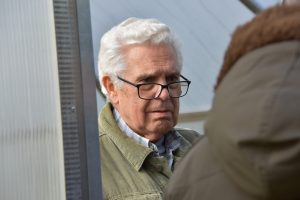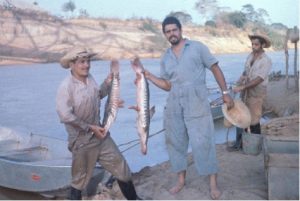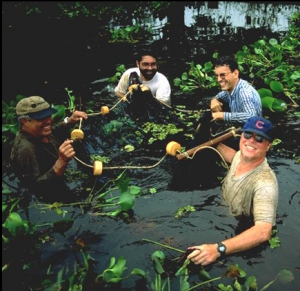This spring, Wesleyan will offer its first-ever ENVS course taught in Spanish, ENVS283/LAST383, Venezuela: The Effect of Oil Discovery on People, the Environment, and Democracy. The course will be taught by Antonio Machado-Allison, former Menakka and Essel Bailey ‘66 Visiting Scholar in the College of the Environment and current research fellow in the College of the Environment. He was recently named a member of the Academia de Ciencias de América Latina.

Tell us about ENVS283. Why are you focusing on Venezuela?
Antonio Machado-Allison (AMA): Being a Venezuelan scholar and witnessing what is happening in my country, one way I think I can help my people is to let citizens of other countries know how Venezuela arrived at these conditions. In the course we will discuss the key factors that have affected the development of Venezuela and its environment from the pre-colonial period to the present through the reading of interdisciplinary literature that includes anthropology, religion, sociology, environmental sciences, law, and history. Ultimately, we will examine the factors that have led to the collapse of democracy in Venezuela.
Your course divides the history of Venezuela into two critical periods: before and after the discovery of oil. Why?
AMA: The discovery of petroleum and the exploitation of that discovery caused dramatic changes to life in Venezuela—moving Venezuela from being principally an agricultural (rural) country to an urban-industrialized country. By examining the pre- and post-oil economic periods separately, we will learn that the key factors, such as agriculture, land use, and European-colonial influence, changed dramatically with the discovery of oil, thereby transforming many socio-political institutions. The contrasts will include resilience to and eradication of diseases, human rights and slavery, land ownership, human health, impacts on biodiversity and human health, and protections of indigenous cultures.

You are an emeritus full professor of the University of Central Venezuela (UCV), Institute of Tropical Zoology and Ecology. What is the focus of your research and how did you get interested in that research?
AMA: I’ve been interested in biology ever since I was a high school student, principally because I was interested in the work of my older brother, Carlos Machado-Allison, who at that time was a UCV professor interested in ectoparasites of bats. While on expeditions and doing fieldwork with my brother, I met the distinguished ichthyologist Francisco Mago-Leccia, who specialized in fish systematics and biogeography at the Museum of Biology at UCV. I was curious about Mago’s work and I asked him for permission to work with him in the museum. My focus then changed to freshwater fish.
After some time, Mago offered me a job as a technician. As part of his team, I participated in several expeditions to the Venezuelan Llanos and the Venezuelan tributaries of the Amazonas. During the time Mago proposed and directed my undergraduate thesis focusing on peacock bass (family Cichlidae), a predatory freshwater fish, the laboratory was involved in several international programs, including programs with Pomona State University, Duke University, and the Smithsonian, so I met many researchers and their students from abroad. That experience opened the door for me to go to the Smithsonian and do my PhD work (on piranhas and related groups) with Stanley Weitzman.

How did you become a visiting scholar here at Wesleyan?
AMA: As things continued to deteriorate in my country, especially in the academic world, my family accepted the offer of my son to travel to U.S. He knew that my position as Secretary of the Academy placed me as a potential public and political target. So before anything happened beyond threats, we moved to the U.S. with the idea to a) not be a burden to my son and his family and b) to not waste my time in a rocking chair. So my son got in touch with Barry Chernoff here at Wesleyan and William Fink (University of Michigan), to let them know that I was traveling to U.S. to stay. Barry immediately invited me to give a lecture at Wesleyan on what was happening in Venezuela. After that, I was offered the opportunity to be the Menakka and Essel Bailey ‘66 Visiting Scholar of the College of the Environment for the 2018-19 academic year.
I know you and Barry Chernoff have a long history together. When did you first meet?
AMA: We met in 1978 or 1979, at a Biogeography Meeting in Orono, Maine. At that time, I was a graduate student at George Washington University working with Stanley Weitzman in his lab at the Smithsonian Institution on my thesis on phylogeny piranhas. Barry, at the time, was graduating from the University of Michigan and working on groups of fishes in Mexico, so we had a shared interest in the distribution and biogeography of freshwater fishes. After we graduated, we organized several expeditions to the Venezuelan Guiana and Upper Orinoco. Since that time we have had a very close relationship, taking part in several international expeditions and publishing a great number of scientific works together.